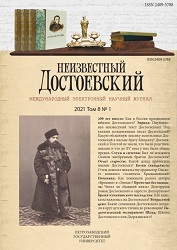Вопрос о расколе в журналах «Время» и «Эпоха» (1861–1865)
The Issue of the Split (Schism) in the Vremya and Epokha Journals (1861–1865)
Author(s): Lyubov V. AlekseevaSubject(s): Cultural history, 19th Century, Sociology of Religion, History of Religion
Published by: Петрозаводский государственный университет
Keywords: “Vremya” (“Time”); “Epokha” (“Epoch”); Fyodor Dostoevsky; pochvennichestvo (native soil); split (schism); Old Belief; sectarianism; zemstvo; commune;
Summary/Abstract: The article is devoted to the issue of the schism in the Vremya and Epokha journals published by the brothers Fyodor and Mikhail Dostoevskys. The content of the articles and reviews published in them is considered from the viewpoint of pochvennichestvo (native soil) position of the publications. The stance of their editorial board is formulated in the Announcement about the publication of the Vremya journal in 1861, which became a program document. The main concept of Vremya, as well as the Epokha journal that followed it, was the need to merge the educated part of society with the people. There was a spiritual, political and social gap, a split between them, which was caused not only by the church reform of the 17th-century, but also by subsequent state reforms that caused people’s rejection. The idea of the Dostoevskys’ journals was to get to know the people, recognize their originality, appeal to the native principle, pochva (soil), the communal form of life, the synthesis of the ideas developed in Europe, which will find their development in the Russian narodnost’ (Russian people). These thoughts were absorbed by F. M. Dostoevsky’s idea of enhanced knowledge of Russia, which was reflected in his article “Two Camps of Theorists.” Using the publications in the Vremya and Epokha journals, it is demonstrated that the concept of split (schism) in the minds of the 19th-century authors was much broader than the historical phenomenon caused by the 17th-century church reform. They consider the split not only as a religious, but also as a social and political phenomenon that requires deep research and rectification, a synthesis of European and popular principles
Journal: Неизвестный Достоевский
- Issue Year: 8/2021
- Issue No: 1
- Page Range: 120-148
- Page Count: 29
- Language: Russian

